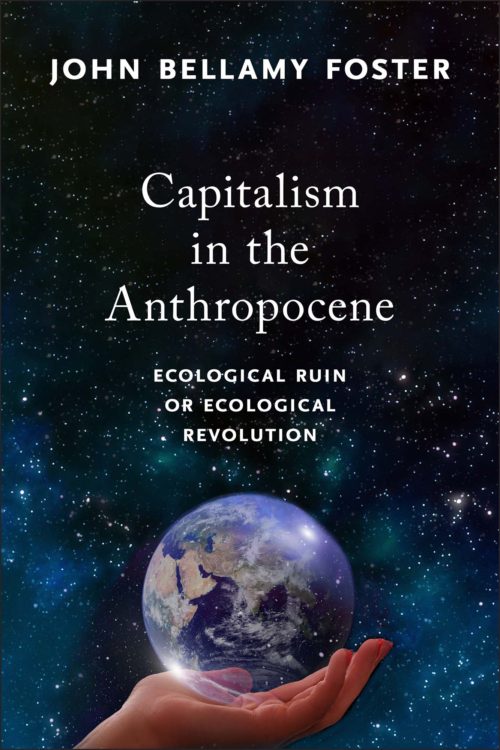Capitalism in the Anthropocene: Ecological ruin or ecological revolution
By John Bellamy Foster
576 pages / $29 paper / 978-1-58367-975-3
By Pietro Daniel Omodeo for Journal of Interdisciplinary History of Ideas
…In Capitalism in the Anthropocene, Foster gathers a large collection of essays (almost 700 pages), most of which have already appeared in the Monthly Review, which is the journal that has established ecology as a crucial theme of the Marxist left, especially thanks to his engagement as an editor. Given the cumulative character of the volume, some redundancies are unavoidable. However, the reader never gets the impression that any of the parts are superfluous, owing to the insistent relevance of the themes as well as to Foster’s analytical and didactic capacity of dealing with complex socio-environmental themes. Moreover, the unitary character of this publication of his essays, which were previously scattered as journal articles, provides persuasive evidence of the strength and systematic consistency of Foster’s outlook.
The twenty-two Chapters that compose the book are grouped into three macro-sections. Part One, “The Planetary Rift” deals with the state of the art of the environmental debates relevant to the Anthropocene. Crucial concepts, like those of the ‘universal metabolism’ of nature and the Capital-induced ‘metabolic rift’ are first discussed in this section. Part Two, “Ecology as Critique,” mainly deals with the theoretical instruments and intellectual strands that, according to Foster, ought to be reassessed in order to face the present challenges, which are at once theoretical and political. Foster derives eco-political concepts and insights from Marx, Engels and Weber, as well as western and Soviet environmentalists. Part Three, “The Future of History,” calls for collective action to establish a new material-cultural socialist civilization that is able to overcome the catastrophic tendencies of capitalist accumulation, which are devastating the planet, killing its living species and threatening the survival of humanity.
Among the many themes of the book, I limit myself to stressing those I deem to be the most relevant in connection with the geo-anthropological theme that is the focus of this thematic issue of the Journal of Interdisciplinary History of Ideas.
The most obvious commitment on the author’s part is to demonstrate that Marxism constitutes an indispensable scientific pathway to an accurate comprehension of the Anthropocene and its problems, and to detect a possible escape from the existential threat to humanity. Marx’s ‘universal metabolism’ indicates the necessary dependence of human societies on environmental conditions (p. 49), but the capitalist ‘robbery’ of the working class and the soil (the two sources of wealth) has created a “metabolic rift” (p. 54), a fracture between societal processes and natural cycles, with catastrophic consequences.
According to Foster, the Marxist dependency-and-rift conception of the relation between capitalist societies and the environment is a better gateway to the Anthropocene than widespread social-monistic tendencies. These include simplistic forms of the biologization of culture, the naturalization of capitalism or, conversely, the idealistic subsumption of nature to economy (Chap. 11).
Fighting against these tendencies, Foster suggests that we interpret the Anthropocene as a “dialectic of continuity and discontinuity” (according to an expression by István Mészáros, p. 83). Indeed, the capitalist “mechanism of overgrowth” (in accordance with Howard Odum, p. 87) wages a war against the planet. Hence, the ecological crisis cannot be easily solved by detecting technofixes, for instance, renewable energies (discussed in Chap. 5) or geo-engineering (Chap. 6), unless technology is also accompanied by radical societal change….
Read the full review at the Journal of Interdisciplinary History of Ideas

Comments are closed.